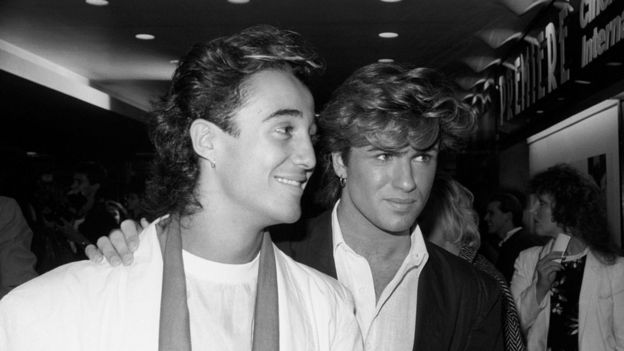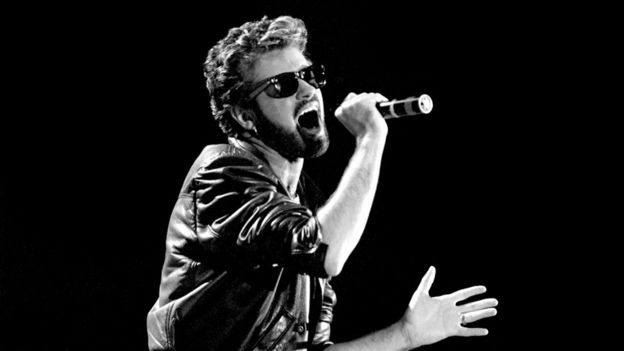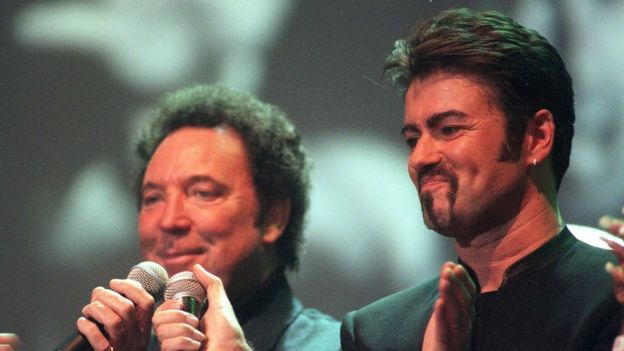The star, who launched his career with Wham! in the 1980s and had huge success as a solo performer, "passed away peacefully" on Christmas Day in Goring, Oxfordshire, his publicist said.
His talents as a singer, songwriter and music producer made George Michael one of the world's biggest-selling artists.
Blessed with good looks and a fine singing voice, his stage presence made him a favourite on the live concert circuit as he matured from teen idol to long term stardom.
After early success in the duo Wham! he went on to build a solo career that brought him a string of awards and made him a multi-millionaire.
But there were times when his battle with drugs and encounters with the police made lurid headlines that threatened to eclipse his musical talents.
George Michael was born Georgios Kyriacos Panayiotou in North London on 25 June 1963. His father was a Greek Cypriot restaurateur who had come to the UK in the 1950s, while his mother was an English dancer.
It was not altogether a happy childhood. Michael later recalled that his parents worked constantly to improve their financial status leaving little room for affectionate moments. "I was never praised, never held. So it wasn't exactly the Little House on the Prairie."
He moved with his family to Hertfordshire while in his teens and met Andrew Ridgeley, a fellow pupil at a local school. The two discovered they had a shared interest in music and, together with a group of friends, formed a ska band which had a short lived existence.
In 1981 Michael and Ridgeley formed Wham! Their first release, Wham Rap! failed to trouble the charts but the follow up, Young Guns (Go For It) established the group after they were asked at the last minute, to perform it on Top of the Pops complete with dancers. The record quickly rose to No 3 in the UK charts.

The duo initially adopted a leather-clad rebellious image with songs such as Bad Boys, but moved to a more pop-oriented approach with the world-wide hit, Wake Me Up Before You Go-Go, while the band members swapped their leathers for more fashionable attire.
With Michael very much the front man, it was almost inevitable that he would eventually strike out on his own. The 1984 single, Careless Whisper, while co-written by Ridgeley, was to all intents and purposes a George Michael solo effort. Indeed it was credited to Wham! featuring George Michael in the US.
Wham! finally split up in 1986 and in the spring of the following year Michael released I Knew You Were Waiting (For Me) a duet with one of his musical icons, Aretha Franklin.
He was also beginning to experience doubts about his sexuality. In an interview with The Independent he blamed his depression after the Wham! breakup on the dawning realisation that he was not bisexual but gay.
Legal battle
Michael spent most of 1987 writing and recording his first solo album, Faith, which was released in the autumn of that year. It went to the top of both the UK and US charts going on to sell more than 25 million copies and winning a Grammy in 1989.
The first single from the album, I Want Your Sex, caused some controversy, particularly on US radio stations. Many refused to play it at all while others played a version substituting the word love for sex. In any event the single reached the top three on both sides of the Atlantic.
A 1988 world tour cemented Michael's status as a pop superstar although the constant touring and the adulation of thousands of screaming teenage girls left him feeling exhausted and only exacerbated the periods of depression that he was now beginning to experience on a regular basis.
Indeed he refused to promote his second album, Listen Without Prejudice Vol. 1 and no videos were made to back up the single releases. A much more introspective work than Faith, the album was aimed at a more adult audience.

It failed to achieve the success of his previous work in the US although there were contrasting fortunes in the UK where it actually outsold Faith.
While playing a concert in Rio on his Cover to Cover tour in 1991 he met Anselmo Feleppa, the man who would become his partner, although Michael still did not publicly state that he was gay. Their relationship was to be short-lived as Feleppa died of a brain haemorrhage in 1993.
Plans for Listen Without Prejudice Vol 2 were scrapped amidst a legal dispute with his record company, Sony. In what proved to be a long and costly battle Michael finally severed his relationship with Sony.
In November 1994, Michael released the single, Jesus to a Child, a tribute to his dead lover, Feleppa. It went straight to No 1 in the UK. The single featured on the Older album, which had been three years in the making when it was released in 1996.
Coming out
A dark and sometimes melancholy work, Older contained a number of references to his sexuality and his change of image saw the long hair and beard replaced by a cropped haircut and leather clothes.
The album was a big success in the UK and Europe but achieved disappointing sales in the US, where audiences still seemed to hanker after Michael the pop superstar rather than the more serious artist that he had aspired to become.
He was voted Best British Male at the Brit Awards and won the title Songwriter of the Year for the third time at the Ivor Novello awards.
The death of his mother from cancer saw him spiral into another round of depression. He told GQ magazine that he had contemplated suicide and had only been dissuaded by the support of his new partner, Kenny Goss.
 PA
PA
In April 1998 he was arrested in a Beverley Hills public toilet by an undercover police officer and charged with engaging in a lewd act. He was fined and sentenced to 80 hours of community service.
The incident finally persuaded him to go public about his sexuality and his relationship with Kenny Goss, a Dallas based businessman.
He continued to record, releasing an album of cover tracks in 1999 entitled Songs from the Last Century, before spending two years writing and recording the album, Patience, which was released in 2004.
It was seen as something of a comeback, achieving instant success in the UK and even reaching No. 12 in the US, a market that seemed to have rejected him.
Following the release of Patience, he told the BBC that he would no longer make albums for sale to the public, preferring to produce free downloads of his music and ask fans to contribute money to charity.
In 2006 he set off on his first live tour for 15 years and became the first artist to perform at the newly reopened Wembley Stadium.
His private life continued to dominate the headlines. In February 2006 he was arrested and charged with possession of class C drugs and in July of that year the News of the World printed allegations that he had been engaging in sexual activity on London's Hampstead Heath.
Michael threatened to sue photographers for harassment but admitted that he often went out at night seeking what he called "anonymous and no-strings sex."
In August 2010 he was sentenced to eight weeks' imprisonment after pleading guilty to driving while under the influence of drugs. He was released after serving half his sentence.
Just before the start of a concert in Prague in 2011 he announced that he had split from his partner Kenny Goss two years previously, blaming Goss's addiction to alcohol and his own battles with drugs.
George Michael was a man whose talent made him a global star but he was never comfortable in that role. He once admitted that, in his younger days, the figure adored by thousands of screaming fans was just a kind of alter-ego he sent out on stage to do a job.
He fought hard to be accepted as a serious singer-songwriter and record producer, and successfully adapted his style to suit a more mature audience, all while struggling with depression and doubts over his sexuality.
He will be remembered as one of the more enduring musicians of the 80s generation.
